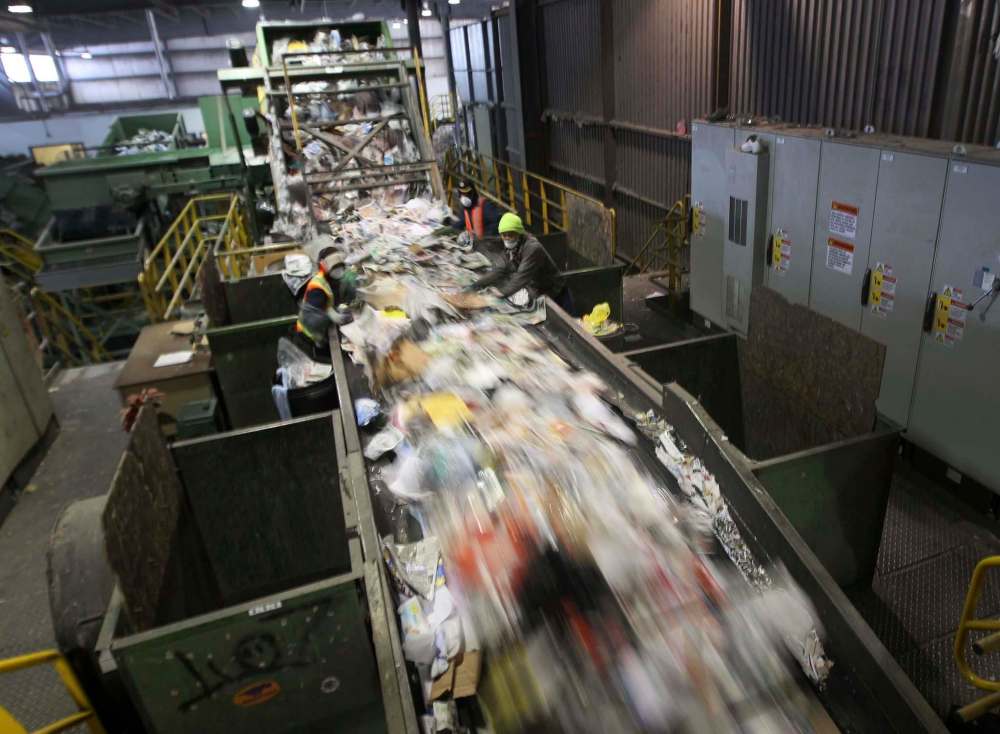City’s recycling cost to increase after too much ‘crap’ put into bins
Advertisement
Read this article for free:
or
Already have an account? Log in here »
To continue reading, please subscribe:
Monthly Digital Subscription
$0 for the first 4 weeks*
- Enjoy unlimited reading on winnipegfreepress.com
- Read the E-Edition, our digital replica newspaper
- Access News Break, our award-winning app
- Play interactive puzzles
*No charge for 4 weeks then price increases to the regular rate of $19.00 plus GST every four weeks. Offer available to new and qualified returning subscribers only. Cancel any time.
Monthly Digital Subscription
$4.75/week*
- Enjoy unlimited reading on winnipegfreepress.com
- Read the E-Edition, our digital replica newspaper
- Access News Break, our award-winning app
- Play interactive puzzles
*Billed as $19 plus GST every four weeks. Cancel any time.
To continue reading, please subscribe:
Add Free Press access to your Brandon Sun subscription for only an additional
$1 for the first 4 weeks*
*Your next subscription payment will increase by $1.00 and you will be charged $16.99 plus GST for four weeks. After four weeks, your payment will increase to $23.99 plus GST every four weeks.
Read unlimited articles for free today:
or
Already have an account? Log in here »
Hey there, time traveller!
This article was published 18/05/2019 (2375 days ago), so information in it may no longer be current.
With China closing the door on imported recyclables and recyclers in countries that still take the stuff paying less for it, cities such as Winnipeg are feeling the pinch.
“China was taking everything and giving a better return,” said Mark Kinsley, the city’s supervisor of waste diversion. “Now China has said, ‘We’re getting too much crap.’”
By “crap,” he means contaminated material, a problem that’s plagued all cities that recycle.

The most recent statistics for Winnipeg show 32.9 per cent of residential solid waste was diverted away from landfills in 2016, but a recycling material audit shows the level of contamination in the city’s recycling programs from July 2016 to June 2017 was more than 13 per cent.
“It’s higher now,” Kinsley said. “Since then, it’s gone up as high as 18 per cent.”
The amount of “crap” that was slipping into the recycling but wasn’t supposed to be there is one of the reasons China stopped taking the recyclables, he said.
Now the countries that still take recyclables, including India and Malaysia, are paying less for it, Kinsley said.
The city pays a company to handle its recycling. The company sells it and ships it to a country such as Malaysia or India. They’re willing to pay for it because they need the materials to make products.
“It’s a buyer’s market… The costs of recycling haven’t gone up, the revenue has gone down,” he said. That revenue offset the city’s costs for recycling, Kinsley said.
In June, a report to Winnipeg city council will outline how much more recycling will cost the city as a result, said Kinsley, who couldn’t divulge those numbers ahead of time.
In a world where people keep making more things from paper and plastic and throwing them away, recycling is the right thing to do, he said.
“It keeps things out of the landfill and it makes resources go further.”
Winnipeg’s recycling woes would be lessened if residents stopped buying so much stuff that’s wrapped in wasteful packaging, and quit their “wishful recycling” or “wish-cycling,” Bethany Daman said.
“One of the key things we talk about is being extremely conscious of the things you’re bringing into your house,” said Daman, the “living green, living well” co-ordinator at Winnipeg’s Green Action Centre. “A lot of waste is packaging,” she said, railing against things such as grocery stores selling mushrooms on plastic trays covered in plastic wrap — neither of which are recyclable. The centre is urging people to cut out single-use products such as disposable coffee cups and plastic cutlery, especially during “Plastic-free July.”
Daman wants to stop all the “wish-cycling” — the belief that “if we put it in there, maybe it will get recycled.”
She said dirty diapers, plastic bags, and unrinsed paper and plastic food containers with congealed leftovers inside aren’t recyclable and can cause problems if they’re put in recycling bins.
“It goes back to the education side,” Daman said. “Make sure you’re not contaminating your bin” by including things like gunky containers that slop all over newsprint and cardboard.
That’s part of what prompted China to slam the door on imported recyclables, Kinsley said. China’s recent refusal to take them initiated a “huge shift” in where cities can send their stuff and highlighted the importance of uncontaminated collection, he said.
“People need to be more knowledgeable and diligent with what they’re recycling. Winnipeggers need to know what’s on our ‘acceptable’ list.”
carol.sanders@freepress.mb.ca

Carol Sanders
Legislature reporter
Carol Sanders is a reporter at the Free Press legislature bureau. The former general assignment reporter and copy editor joined the paper in 1997. Read more about Carol.
Every piece of reporting Carol produces is reviewed by an editing team before it is posted online or published in print — part of the Free Press‘s tradition, since 1872, of producing reliable independent journalism. Read more about Free Press’s history and mandate, and learn how our newsroom operates.
Our newsroom depends on a growing audience of readers to power our journalism. If you are not a paid reader, please consider becoming a subscriber.
Our newsroom depends on its audience of readers to power our journalism. Thank you for your support.

